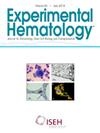Sex-stratified association of variants in the serotonin 1A receptor gene with acute crisis pain among African American patients with sickle cell disease
IF 2.1
4区 医学
Q2 HEMATOLOGY
引用次数: 0
Abstract
Patients with sickle cell disease (SCD) experience pain in their daily lives. Both the acute and chronic pain phenotypes of this disease exhibit high variability, making pain management a challenge. The underlying reasons for the phenotypic variability are poorly understood. Given the importance of serotonergic neurotransmission in pain signaling, we aimed to explore the role of variants in the 5-HT1A receptor gene (HTR1A) on pain variability in SCD. Four variants (rs6449693, rs878567, rs6294, and rs10042486) in HTR1A were genotyped in a cohort of 131 African Americans with SCD. Acute and chronic pain were measured by the acute care utilization and the McGill Pain Questionnaire, respectively. Association analyses were performed for three genetic models (additive, dominant, and recessive). Three variants (rs6449693, rs6294, and rs10042486) in HTR1A showed significant association with crisis pain in both the additive and dominant models. Although the G allele of rs6449693 and the C allele of rs10042486 associated with lower acute crisis pain, the T allele of rs6294 associated with increased acute crisis pain. Sex-stratified analyses revealed that the associations of these three variants with acute pain were significant only in men, but not in women. Furthermore, the A allele rs878567 that did not reach statistical significance in the overall cohort showed a significant association with lower crisis pain in men. To our knowledge, as the first study to explore the role of HTR1A variants in sickle cell pain, we identified that four variants across the gene are associated with acute crisis pain in SCD in a sex-stratified manner.
5 -羟色胺1A受体基因变异与非裔美国人镰状细胞病患者急性危重性疼痛的性别分层关联
镰状细胞病(SCD)患者在日常生活中遭受痛苦。这种疾病的急性和慢性疼痛表型都表现出高度的可变性,使疼痛管理成为一项挑战。表型变异的潜在原因尚不清楚。鉴于5-羟色胺能神经传递在疼痛信号传导中的重要性,我们旨在探讨5-HT1A受体基因(HTR1A)变异在SCD疼痛变异性中的作用。在131名患有SCD的非裔美国人队列中,对HTR1A的四个变体(rs6449693、rs878567、rs6294和rs10042486)进行了基因分型。急性和慢性疼痛分别采用急性护理利用和McGill疼痛问卷进行测量。对三种遗传模型(加性、显性和隐性)进行关联分析。HTR1A的三个变体(rs6449693、rs6294和rs10042486)在加性模型和显性模型中都显示出与危机疼痛的显著关联。rs6449693的G等位基因和rs10042486的C等位基因与急性危重性疼痛的降低相关,而rs6294的T等位基因与急性危重性疼痛的增加相关。性别分层分析显示,这三种变异与急性疼痛的关联仅在男性中显著,而在女性中没有。此外,在整个队列中未达到统计学意义的A等位基因rs878567与男性较低的危机感疼痛有显著关联。作为探索HTR1A变异在镰状细胞疼痛中的作用的第一项研究,我们发现该基因的四种变异以性别分层的方式与SCD的急性危重性疼痛相关。
本文章由计算机程序翻译,如有差异,请以英文原文为准。
求助全文
约1分钟内获得全文
求助全文
来源期刊

Experimental hematology
医学-血液学
CiteScore
5.30
自引率
0.00%
发文量
84
审稿时长
58 days
期刊介绍:
Experimental Hematology publishes new findings, methodologies, reviews and perspectives in all areas of hematology and immune cell formation on a monthly basis that may include Special Issues on particular topics of current interest. The overall goal is to report new insights into how normal blood cells are produced, how their production is normally regulated, mechanisms that contribute to hematological diseases and new approaches to their treatment. Specific topics may include relevant developmental and aging processes, stem cell biology, analyses of intrinsic and extrinsic regulatory mechanisms, in vitro behavior of primary cells, clonal tracking, molecular and omics analyses, metabolism, epigenetics, bioengineering approaches, studies in model organisms, novel clinical observations, transplantation biology and new therapeutic avenues.
 求助内容:
求助内容: 应助结果提醒方式:
应助结果提醒方式:


